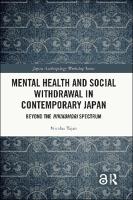Mental Health and Social Withdrawal in Contemporary Japan
Beyond the Hikikomori Spectrum
| dc.contributor.author | Tajan, Nicolas | |
| dc.date.accessioned | 2021-02-23T11:54:42Z | |
| dc.date.available | 2021-02-23T11:54:42Z | |
| dc.date.issued | 2021 | |
| dc.identifier | ONIX_20210223_9781351260794_15 | |
| dc.identifier | ONIX_20210223_9781351260794_15 | |
| dc.identifier | OCN: 1247606879 | |
| dc.identifier.uri | https://library.oapen.org/handle/20.500.12657/46926 | |
| dc.description.abstract | This book examines the phenomenon of social withdrawal in Japan, which ranges from school non-attendance to extreme forms of isolation and confinement, known as hikikomori. Based on extensive original research including interview research with a range of practitioners involved in dealing with the phenomenon, the book outlines how hikikomori expresses itself, how it is treated and dealt with and how it has been perceived and regarded in Japan over time. The author, a clinical psychologist with extensive experience of practice, argues that the phenomenon although socially unacceptable is not homogenous, and can be viewed not as a mental disorder, but as an idiom of distress, a passive and effective way of resisting the many great pressures of Japanese schooling and of Japanese society more widely. | |
| dc.language | English | |
| dc.relation.ispartofseries | Japan Anthropology Workshop Series | |
| dc.subject.classification | thema EDItEUR::G Reference, Information and Interdisciplinary subjects::GT Interdisciplinary studies::GTM Regional / International studies | en_US |
| dc.subject.other | Regional studies | |
| dc.title | Mental Health and Social Withdrawal in Contemporary Japan | |
| dc.title.alternative | Beyond the Hikikomori Spectrum | |
| dc.type | book | |
| oapen.identifier.doi | 10.4324/9781351260800 | |
| oapen.relation.isPublishedBy | d86614f7-ab0b-42bf-a3b7-053fda9617b2 | |
| oapen.relation.isFundedBy | Kyoto University | |
| oapen.imprint | Routledge | |
| oapen.pages | 248 |

